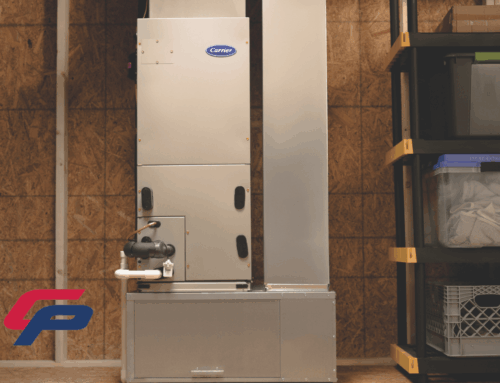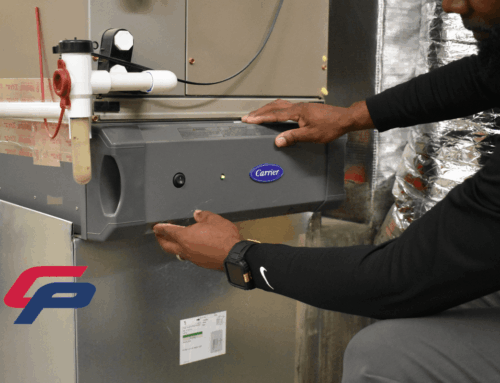How to Prepare Your Furnace for a Delmarva Winter: A Checklist
Delmarva winters can shift quickly from mild mornings to freezing nights, and those temperature swings put real stress on home heating systems.
Most furnace breakdowns on the Eastern Shore happen during the first hard cold snap, when long-unused systems are forced to run at full capacity. Preparing early helps prevent mid-winter emergencies, improves energy efficiency, and keeps your home warm all season long.
Below is a local, practical furnace maintenance checklist designed for homeowners in Sussex County and the entire Delmarva coastal region.
Quick Answer: What should be on a furnace maintenance checklist?
A complete furnace maintenance checklist includes:
- Changing the air filter
- Inspecting vents and exhaust connections
- Checking thermostat settings
- Clearing return and supply vents
- Inspecting the blower compartment
- Testing carbon monoxide detectors
- Ensuring safe ignition and flame quality
- Scheduling a professional tune-up before peak winter
Keep reading to get details for each step, with local considerations for Delmarva’s humidity and salt air, and steps specific to heating systems that run on propane, electricity, or heating oil.
1. Start With the Furnace Filter
Common question: How often should I change my furnace filter in winter?
- Replace the filter every 30–60 days in winter.
- Use the correct filter size (check the panel on your furnace).
- If you have pets or allergy concerns, consider MERV 8-11 for better filtration.
Delmarva’s coastal humidity pulls more dust and moisture into return vents, which can clog filters faster than inland homes. A clogged filter forces the furnace to work harder, raising winter energy bills and shortening system lifespan.
2. Check Your Thermostat and Heating Cycles
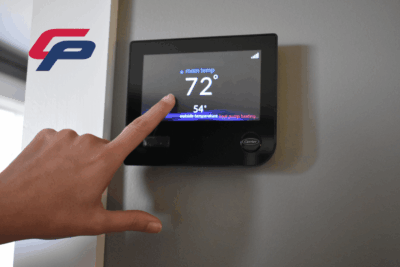 Common question: Why is my furnace cycling on and off?
Common question: Why is my furnace cycling on and off?
This is a common problem in freezing temperatures, especially with heat pumps, and is called “short cycling.” Check for:
- Correct mode: HEAT (or emergency/auxiliary heat, if your unit is short cycling and not heating; it may be frozen)
- Dead batteries in digital wall thermostats
- Drafts or sunlight affecting thermostat accuracy
Give your thermostat a quick test before cold weather hits, to make sure it runs and produces heat to your thermostat set temperature, then turns off until the temperature needs a heat boost.
If your furnace cycles rapidly, heats unevenly, or never reaches the set temperature, that’s a sign you need to schedule HVAC or furnace service.
3. Clear and Open All Vents and Registers
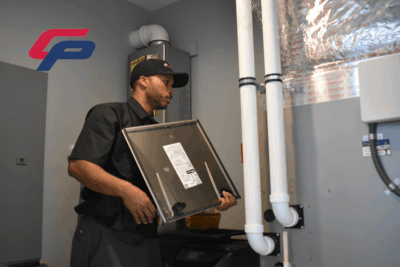 Common question: Why are some rooms colder than others?
Common question: Why are some rooms colder than others?
Many homes lack well-designed, zoned heating systems. Older homes, especially, can have issues with cold zones. Before winter:
- Move furniture and rugs away from vents
- Vacuum visible dust inside vent covers
- Make sure return vents are not blocked by decorations or holiday storage bins
Closed or blocked vents make your furnace work harder and can damage ductwork over time. Homes in older Sussex County and Wicomico County neighborhoods also often have undersized return airflow. Keeping vents clear helps systems operate more efficiently.
4. Inspect the Furnace Area for Safety
Common question: What should I keep away from my furnace?
Your furnace needs space to breathe. For safe operation:
- Keep boxes, storage totes, and cleaning chemicals at least 3 feet away
- Make sure children or animals don’t have access to the furnace area
- Look for visible signs of rust or water leaks
- Check the flame (if visible) for a steady blue burn
- Make sure the shut-off switch is accessible
If you smell gas or see soot around the furnace, call a professional immediately. Comfort Plus Services offers 24/7 Emergency HVAC and Furnace Service. Call us at 866-950-2653.
5. Test Your Home and System Gas Detectors
Common question: Do I need carbon monoxide (CO) detectors with a gas furnace?
Yes, always. Winter brings the highest risk of carbon monoxide exposure due to closed windows and longer heating cycles. For propane and oil furnaces, CO detectors are especially important. Many Delmarva homes depend on these fuel types. If your system runs on propane and has a propane gas detector, test it when you test your other detectors.
Keep your family’s safety devices in good working order before the winter heating season truly begins:
- Ensure carbon monoxide and smoke detectors are installed near sleeping areas
- Replace batteries, whether primary or backup batteries for wired systems
- Press the TEST button
- Make sure your family knows what that alarm sound means, and what to do next
6. Inspect Exhaust Pipes, Flue, and Outdoor Heat Pump Components
 Common question: Why does my furnace smell when I turn it on?
Common question: Why does my furnace smell when I turn it on?
A musty HVAC smell usually means moisture or microbial buildup inside the system or ducts. A more acrid, burning smell that is temporary and clears out quickly could indicate dusty heating elements. A smell that persists could be a warning sign of mechanical problems or safety issues such as:
- Blocked vents or exhaust pipes
- Flue pipes installed too closely to wood or drywall
- Signs of animal nests or debris
- White, powdery corrosion on metal vent connections
A blocked exhaust pipe can trigger furnace shutdowns or unsafe operation. Salt air near the coast (Fenwick, Rehoboth, Ocean City) can corrode metal components faster than in inland areas, leading to mechanical failures in heating systems.
7. Listen for Early Warning Sounds
Common question: Why does my furnace make noise at startup?
Noises that get your attention when you first turn on the heat can indicate a problem that will only get bigger (and more expensive) if it’s not addressed.
Before temperatures drop, run your furnace for 10-15 minutes and listen for:
- Banging or rattling
- Screeching from blower belts
- Delayed ignition “puffs”
- Grinding motor sounds
Early noise = early fix. Many Delmarva emergency heating calls happen after homeowners ignore these signals in the fall.
8. Know the Typical Furnace Tune-Up Cost on Delmarva
Common question: What does a furnace tune-up cost?
Prices vary by region, but on the Eastern Shore, homeowners typically see:
- Around $150 for a standard seasonal tune-up
- Around $325 for deeper cleaning on older systems
Service Plan members receive discounted services and priority HVAC maintenance service scheduling before big weather changes in the fall and spring.
9. Schedule a Professional Furnace Service Call
Common question: What’s included in a furnace tune-up?
A CPS furnace tune-up is a preventive maintenance visit from a certified technician who will:
- Test ignition and flame quality
- Check heat exchanger condition
- Clean burners and blower compartments
- Inspect safety switches
- Evaluate duct airflow
- Calibrate thermostat
- Confirm overall system health
Most local homeowners schedule this between mid-October and early December to avoid the seasonal rush during the first freeze.
10. Consider a Service Plan for Peace of Mind, All Year Long
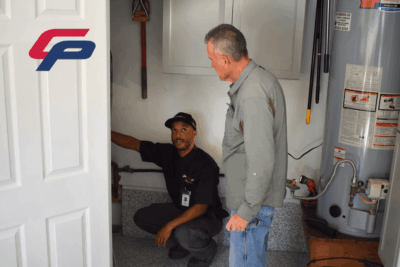 Comfort Plus Service Plans apply to any type of heating system, ensuring regular maintenance and system checks. Our customers appreciate the benefits of not having to worry about HVAC and furnace maintenance, including:
Comfort Plus Service Plans apply to any type of heating system, ensuring regular maintenance and system checks. Our customers appreciate the benefits of not having to worry about HVAC and furnace maintenance, including:
- Priority scheduling
- 24/7 Emergency HVAC and furnace service availability
- Lower repair costs
- Fewer mid-winter surprises
- Longer furnace lifespan
For many Eastern Shore homeowners with vacation homes or older systems, maintenance plans offer preventive services for reliable system performance throughout the year.
Schedule Furnace Service Now
Consider booking your annual furnace tune-up before the winter cold sets in for good. We’ll help you keep your heating system safe, efficient, and ready to keep your home warm and dry through any wet and cold Delmarva winter.

